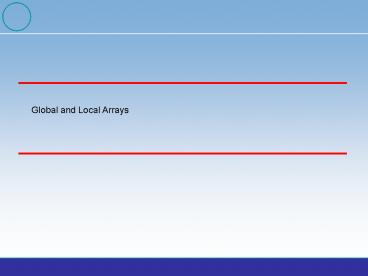SCGSN Nov-96 - PowerPoint PPT Presentation
Title:
SCGSN Nov-96
Description:
Stations near the ocean are noisier. This peak is caused by ocean waves breaking on coastlines. This peak is caused by ocean waves also. ... – PowerPoint PPT presentation
Number of Views:13
Avg rating:3.0/5.0
Title: SCGSN Nov-96
1
Global and Local Arrays
2
Topics covered
- Types of seismic arrays
- How arrays are used
- Example global networks
3
Seismic array
- Has common time base (one clock)
- Has common recording center
- Waves remain coherent as they propagate across
the array
Recorded by the SOSN/POLARIS Seismic Network
4
An array can be used as an antenna to determine
the direction from which the seismic waves
arrive. This process, called beamforming, tells
where the earthquake is located.
5
The NORSAR Array
6
Seismic traces recorded at 4 sub-arrays of the
NORSAR array in Norway Each group of 5 traces is
from one sub-array. Inconsistent amplitude
behaviour of the phases due to differences in the
site responses of the rocks beneath each
sub-array
7
Array examples
GBA
WRA
YKA
8
Mantle velocity structure and arrays
Model 1 Smooth increase in velocity with
depth Upper mantle travel-time curve has no
triplications
Model 2 This model has a 400 km and 650 km
transition zone The travel-time curve has 2
triplications
9
- Two phases are seen arriving at the array. The
distance to the earthquake was 21.69 degrees. - Slowness measurements shown on the right graph
clearly shows the two phases are arriving with
different slowness
- This indicates the presence of 2 travel-time
branches - Numerous slowness measurements from many arrays
confirmed that upper mantle has 2 discontinuities
or transition zones.
A record section from the Yellowknife array in
Canada
10
Upper Mantle Ray Paths
11
Seismic network
- Each stations clock is independent
- Data recording may be at the station or at a
common data center
- Waves may not be coherent as they propagate
across the network
12
In a network, the location of an earthquake is
found by triangulation. Information from all
stations is used.
13
The Earth acts like a filter!
High frequency waves attenuate (damp out) rapidly
with distance. Low frequency waves diminish in
amplitude more slowly with distance traveled.
14
IRIS GSN SYSTEM
Global networks choose instruments capable of
recording long period waves. Local arrays may
use short period sensors to record local
earthquakes.
15
The 2004 Sumatra-Andaman Islands quake radiated
very long period seismic waves that were recorded
by global networks.
16
Global Networks
IRIS/USGS GLOBAL NETWORK
17
GSN Goals
- develop high quality seismic data acquisition
equipment - deploy systems globally at 2000 km spacing
- make data openly available to all who request a
copy
18
GSN data are used to study the internal seismic
structure of the Earth
Courtesy of Adam Dziewonski, Harvard University
19
(No Transcript)
20
(No Transcript)
21
(No Transcript)
22
Regional networks
- The future Earth coverage will depend
increasingly on regional and national networks. - These are supported for surveillance and alert,
- often have more stable budget and recognition
- are less interested in technical developments
- require real-time data availability and
processing - are less strict about VBB standards
- participate less in FDSN activities
- rarely have science under their mandate
- Extreme challenge to organize an efficient data
exchange - National priorities and requirements,
restrictions to data access
23
German GEOFON Network
24
French GEOSCOPE Network
25
Japan HiNET
26
Chinese Digital Seismic Stations
27
Plans for the Indian Ocean
Courtesy L. Kong
28
A note on noise at seismic stations.
The quietest stations in the world are on
continents.
Stations near the ocean are noisier.
29
This peak is caused by ocean waves breaking on
coastlines.
30
This peak is caused by ocean waves also.
31
An important source of long period noise is
changes in air pressure.
32
If possible, locate seismic stations away from
the coast where noise conditions are better
(noise is lower).































